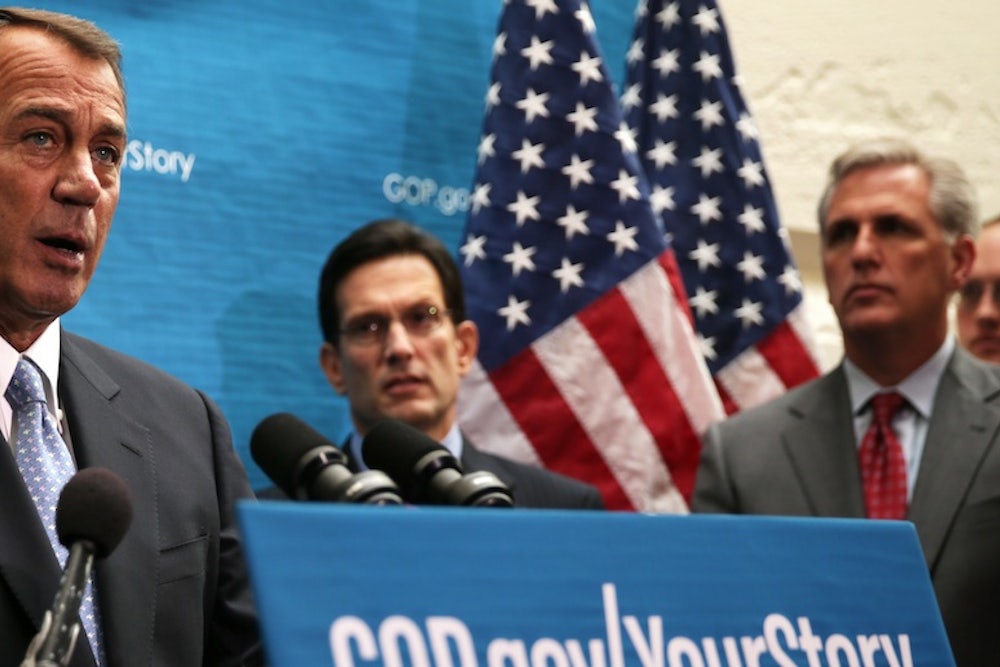More than 8 million people have signed up for private insurance plans through the Affordable Care Act, several million more have gotten coverage through Medicaid, and polling from several independent organizations suggests that the number of Americans without insurance is falling by a substantial margin. In response, some Republicans are changing the focus of their arguments. Even if the law isn’t the total failure conservatives once imagined, they’re saying, it’s still very far short of a success.
Here, for example, is a recent tweet from the office of Kevin McCarthy, the House Majority Whip: “The President's health care law continues to fall short of covering the uninsured, but he still claims it's ‘working.’” The tweet included a link to an article, published in HispanicBusiness.com, focusing on the many millions of Americans who aren’t getting health insurance from the law—and won’t anytime soon.
As a description of the law’s impact—and criticism of its limited reach—this is a perfectly reasonable point. Notwithstanding the good news on enrollment, it remains to be seen whether the number of people without insurance will fall by as much as the official analysts have predicted. Even if it does, many more people will remain uninsured: According to the Congressional Budget Office, there will still be 31 million uninsured people by 2025, once the law has taken full effect. It would be even more (56 million) without the law, but that’s still a large population with no protection from medical bills. Nobody knows that better than the law’s supporters, many of whom continue to fight for more ambitious and generous efforts to help the un- (and under-) insured.
But to hear that criticism from the likes of McCarthy is a bit much. Remember, House Republicans have voted to repeal Obamacare 50 times. They have voted on serious Obamacare alternatives exactly zero times. They haven’t even made a serious attempt to get a bill out of committee, let alone hold a floor debate. A few Republican lawmakers have crafted proposals on their own, as have some conservative intellectuals. But GOP leaders have made it very clear they want nothing to do with these plans.
In addition, a major reason the Affordable Care Act isn’t reaching more people is that Republicans have done their best to limit the law’s reach—primarily, by blocking expansions of Medicaid in states where conservative Republicans hold sway. You’ve probably heard all about this by now, particularly if you read my colleague Alec MacGillis. If not, however, you can just read the very same article that McCarthy’s tweet highlights. It’s right there in the text:
The evolution of the health care law has led to a coverage gap for 4.8 million low-income, childless adults, according to a December survey by Kaiser Family Foundation. The federal government has offered to pay states nearly all of the costs for expanding Medicaid for those who make up to 138 percent of the federal poverty level, or about $16,000 for an individual, to account for this gap. But since the U.S. Supreme Court ruled that expansion was voluntary, 24 states have opted against it.
But the starkest sign of Republican priorities is the one that rarely gets mentioned in the Obamacare debate: The Ryan budget. House Republicans have voted for this document three times now—once for each year that they have controlled the chamber. And while some parts of the proposal have changed, one has remained relatively constant: The call for massive, devastating cuts to Medicaid. According to an analysis by the Center on Budget and Policy Priorities, the most recent Ryan budget would reduce Medicaid spending by 26 percent by 2025. Analysis of previous, similar proposal produced by the Kaiser Family Foundation and analysts from the Urban Institute suggested that between 14.3 and 20.5 million people would lose Medicaid if the Ryan budget became law—and that was in addition to people who would lose coverage once Obamacare’s Medicaid expansion came off the books, as well.

You can quibble with the specific figures. If health care spending ends up much lower than expected, for example, the shortfall would be smaller and fewer people would end up losing coverage. But even in the most optimistic of scenarios, many millions would lose insurance if Ryan’s Medicaid cuts became law. Republicans and their supporters might argue that Medicaid itself is wasteful—and not worth the money it costs. But Medicaid is actually very cheap, on a per person basis. And, again, it’s not like Republicans are simultaneously proposing alternatives that would provide the same or better protection for less money.
That’s pretty much the story with Republicans today. They’ll do whatever it takes—up to and including shutting down the government—to fight a program that’s helping millions of Americans to get health insurance (and millions more to get coverage that’s more comprehensive or more affordable). But they have no interest in crafting a replacement and, then, undertaking the politically difficult work of enacting it. Republicans keep saying that the stereotype about their party is wrong—that they really do care about the poor and uninsured. The claim would be more believable if they started acting that way.
